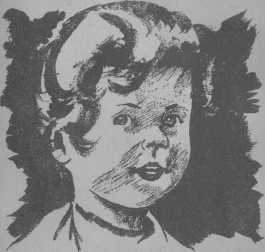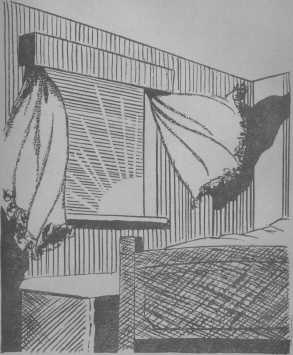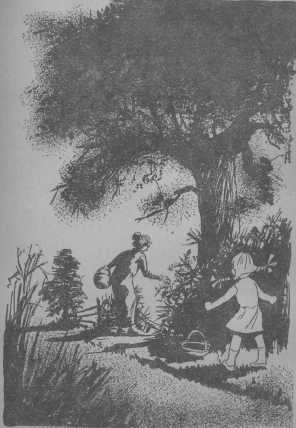Anytime Tales (10 page)

“But what about me with measles?” asked Jenny.
“Ah well—you’ll be told not to go and play with a friend of yours who is ill,” said the New Year. “If you do, you’ll catch measles from her, no doubt about that—and into bed you’ll go. And did you see that picture of you both being chased by a farmer? Well, you probably left his gates open or threw stones at his ducks—and that’s why he’s chasing you. If you’re silly or unkind, that’s what will happen!”
“I see,” said Benjy. “And what about me howling because I didn’t win the scholarship? Aren’t I going to win it? I do so want to.”
“Well, you will if you work hard—but if you don’t, that’s a picture of yourself being sorry because you’ve been lazy and haven’t won it,” said the New Year.
“And the last picture—of me with my hand hurt, and my clothes all scorched and burnt,” said Jennifer, fearfully. “What’s happening there?”
“I expect you’ve played with matches and got yourself on fire,” said the little New Year. “It looks like it. But why do you look so worried? These things haven’t happened yet!”
“But they’re going to happen, aren’t they?” said Jenny, beginning to cry. “They’re in the mirror—and it’s magic,”
“You’re only looking at one side of the mirror!” said the little New Year, and he turned his mirror round so that the other side gleamed in front of them, clear and empty. “Those are the horrid things that the year may hold for you. Here are some of the nice ones!”

The children watched as more pictures came— happy pictures of Jenny laughing and dancing at a party, of Benjy riding an elephant at the Zoo, of them both winning prizes at school, of Benjy being clapped on the back because he had won a scholarship… ah, much nicer pictures than the others!
“But—how can
both
these sets of things happen?” asked Jennifer, surprised. “Benjy can’t lose the scholarship and win it, too!”

“You’re rather slow at understanding, aren’t you?”
said the little fellow, putting his mirror away again. “Any of the things
might
happen, but which happen in the end depends on you and your behaviour now! Don’t you
see?
If Benjy’s lazy he won’t get the scholarship—if he works hard, he will. So either of the things may happen. It all depends on him. And if you disobey your mother and play with matches, you’ll certainly get burnt. But if you are sensible, you will leave the matches alone—and instead of getting burnt you’ll probably go to a party. Didn’t you notice that it was a party dress in the picture that was scorched?” “Yes, I did,” said Jennifer. She sat and thought for
a long time. “I understand what you mean now, little New Year,” she said at last. “You mean that all sorts of things are going to happen—but we
make
them happen ourselves. Oh, I’m glad I’ve peeped into your magic mirror. Now I know what to do. But why don’t you show everyone your mirror? Let them see the things that might happen, then everyone would be extra careful to do sensible, right things, and try to be good and generous.”
“I haven’t time,” said the little New Year. “Besides—people wouldn’t believe me. I’m glad
you
do. I think you’ll have a happy New Year now!”
He slipped across to the window, climbed into the tree and slid down it. “Goodbye,” he said. “The noise has stopped. I must go and find the First of January!”
Off he went. The children lay down in bed, puzzled and wondering—and in the middle of their wondering they fell fast asleep, and didn’t wake till the morning.
Mother came into the room. “Wake up! Happy New Year to you both!” she said.
Jenny sat up. She looked across at Benjy. She remembered the strange visitor they had seen the night before. Or hadn’t they? Was it a dream?
She called softly to Benjy. “Benjy! Do you remember the magic mirror?”
“I shall never forget it,” said Benjy. “Never. Jenny, let’s tell everyone about it. People ought to know that it’s themselves that make a year happy or sad.”
Yes, they ought to know it, and that’s why I’m telling it to you, so that you can make yours a happy one.

And what about Jenny and Benjy? Well, they are sensible children, so I don’t think they will fall in an icy pond, get chased by a farmer, burn themselves, or lose scholarships—but if they do, I’ll be sure to tell you.
Matilda had a dreadful temper. When she was in a rage she went red in the face, shouted—and then stamped her foot!
“Matilda! Please don’t stamp your foot at me!” said her mother crossly. “No matter what you want, I shan’t give it to you if you stamp like that. It’s rude.”
Matilda stamped her foot again. It wasn’t a bit of good—she was just sent up to bed!
So after that she didn’t stamp her foot at her mother any more—only at Jane the maid, George the gardener, and her little friends. They couldn’t send her to bed—but they didn’t like her at all when she stamped her foot at them.
One afternoon Matilda went to pick blackberries in Farmer Gile’s field. She knew where there was a fine hedge of them—and as they were the last of the autumn’s feast of blackberries, she meant to have a very nice time!
But she found a little old lady there, picking away fast, and putting the big juicy blackberries into her basket. Matilda stared in rage.
“I came to pick these blackberries,” she said.

“So did I,” said the old lady, still picking.
“I saw them the other day, and I said to myself that they should be mine and no one else’s,” said Matilda, going red in the face.
“How funny! That’s just what I said to myself!” said the old dame, still picking hard.
Matilda stared crossly, “I want those blackberries!” she said.
“So do I,” said the old lady. “You can share them, can’t you?”
“You’ve picked all the biggest. You’re greedy,” said rude Matilda.
“What an unpleasant child you are!” said the old dame, staring at Matilda out of curious green eyes. Those eyes should have warned Matilda that the old lady was magic, for people with green eyes are not the same as ordinary folk.
“You’re
not
to talk to me like that!” said Matilda— and she stamped her foot. “You’re not to, you’re not to!”
“Don’t stamp your foot at me, or you’ll be sorry!” said the old lady, and her eyes looked rather fierce. But did Matilda care? Not she!
She lost her temper all in a hurry, and began to shout and stamp. “I want those blackberries! (Stamp, stamp!) I want those blackberries! (Stamp, stamp!) I want those blackberries! (Stamp, stamp, STAMP!)”
The old lady looked at Matilda in the greatest surprise. “My dear little girl,” she said, “you shouldn’t have been a child at all. You should have been a pony! Then you could do all the stamping you please!”
“Give me those blackberries!” shouted Matilda, and she stamped so heavily on the grass that she squashed it flat.
“I don’t mind horses stamping at me, but I won’t have little girls behaving like this,” said the old dame, and she waved a thin brown hand at Matilda. “Be a pony! Run away and stamp all you like!”
And then, to Matilda’s enormous dismay, she found that she was no longer a little girl, but a small brown pony with a white star on its head! She had four legs and a long tail!
She stamped with her forefoot on the grass, and opened her mouth to shout--but she neighed instead: “Nay - hay - hay - hay - hay! Nay - hay - hay - hay -hay!”
“Well, if you want hay, go and get it,” said the old lady, going on with her picking. Matilda was frightened by her horse-voice and ran away round the field. Oh dear, this was dreadful! She was a pony— fancy that, a pony! She couldn’t speak like a little girl. She couldn’t pick blackberries, for she had no hands. She could still stamp, and she could wave a long tail about—how very, very queer!
Matilda wanted to go home, so she ran to the field gate. But it was shut. Matilda stamped her foot, and the old lady laughed.
“Stamp away! I always love to see a horse stamping with its hoof—it’s right for horses to paw the ground! Stamp all you like, little pony, and enjoy yourself!”
But Matilda wasn’t enjoying herself one bit. Supposing the farmer came by and put her into the shafts of a cart to carry his goods to market? Suppose he wanted to ride her? He was such a big heavy man. And what about her food? Would she have to eat grass?

Matilda put her big pony-head down to nibble the grass to see what it tasted like. It was horrid! She still had the tastes and feelings of a little girl although she had the body of a pony! Whatever was she going to do? Why, oh, why had she stamped at that old woman?
Just then George, John, Lucy and Fred came into the field. “Look!” cried Fred. “A new pony! Let’s ride him!”
Matilda was full of horror. What—let those children ride on her back? Never! She ran away to a corner of the field, and the children followed.
The pony stamped her foot at them, and the children laughed. “He’s like Matilda!” they cried. “He stamps his foot just like Matilda!”
Just then the children’s mother came along and called them. “Come out of the field, children. There’s no time to play before tea. Come along.”
Tea! Matilda felt hungry. How she wished she could go home to eat cakes, and jam too. But what would her mother say if a pony came running into the house?